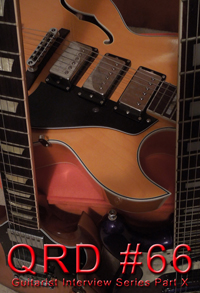
 |
| about
this issue Guitarist Interviews: Gavin MacArthur Gary Murray Joe O'Sullivan Tony Whitlock Jason Williams Lucio Menegon Dan Bridgewood-Hill Igliashon Jones Denny Kopp Drew Jacobs Jason Hendrix |
 |
 |
 |
 |
 |
 |
 |
|
|
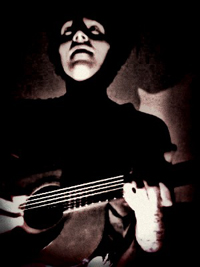 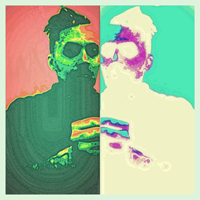 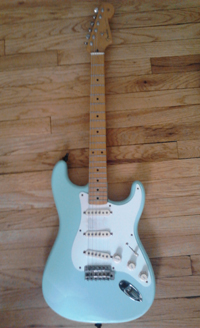 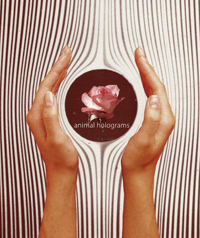 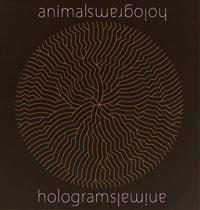 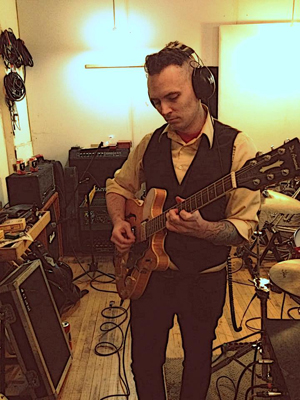                     |
February 2014

Bands: Animal Holograms, Dance Moms, Sunny Shadows (live/touring guitar player), & Haunted Yacht (annual studio recording project)
Websites: soundcloud.com/animalholograms, facebook.com/animalholograms, twitter.com/AnimalHolograms, www.tumblr.com/blog/animalholograms, hauntedyacht.bandcamp.com
QRD – What was your first guitar & what happened to it?
Jason – It was a black & white Fender Squire that my dad bought me for Christmas when I was eleven years old. I still have it collecting dust in my closet. One day while I was skateboarding back home after band practice with my first band, DropOut (yes, spelled just like that) I lost my balance, swerved uncontrollably for a few moments before losing my grip on it & down it went. I busted the headstock right in half. That was the end of that. But it was the event that led directly to my purchase of a sea foam green 1950s re-issue Fender Stratocaster, so it’s not all bad.
QRD – What’s your typical set-up from guitar to effects to amplifier?
Jason – Stratocaster through a Lexicon MX200 into a Marshal VS100 4x12” Marshall cab.
QRD – What’s the most important part of your rig - guitar, amplifier, or effects?
Jason – Always my guitar. A reliable guitar through a shitty amp beats a shitty guitar through a great amp every time. You can’t polish a turd & amplifying a crackly, thin, cheap signal running through an AC30, no matter how many pretty tubes it has, is exactly that -- cheap turds. But plug a Les Paul into an old, shoddy off-brand practice amp & you have vintage mystique or analog radio or something of that nature. The guitar is the most important link in the chain. Always my guitar.
QRD – What’s your main amplifier & why?
Jason – It used to be an Ampeg SVT-350 I borrowed indefinitely from a good friend of mine when I played in a band called Rocket Miner. I used it to play bass naturally since I was the bassist in that band (August 2012 – April 2013), but I’ve always been drawn to the sound of a deep, guttural clean tone when it came to amps. When my friend who played bass in my first band bought his first real amp, an Ampeg combo, for whatever reason, curiosity or boredom I guess, I plugged into it. I fell in love with that tone immediately. No guitar amp on earth can really replicate that deep, smooth, clean tone like a good bass amp does, at least no guitar amp I’ve ever played out of. However, now that he plays bass for another Chicago band, Shrug, I play out of my Marshall VS-100. Why? Because it’s the best & only amp I own. It sounds great particularly out of a 1960A cab or the SVT 4x10. & the sound I get through my Marshall 4x12 certainly does the job, though an upgrade will surely happen in time when I’m not rationing Raman noodle packets to make sure I have money for bus fare.
QRD – What’s your main guitar & what are the features that make it such?
Jason – It used to be an alpine white Gibson Les Paul Studio with gold hardware. There was nothing customized or unique about it. If it isn’t broken, don’t fix it. No, actually I doubt I really live by that adage. If I had the extra coin to splurge I’d have done a couple of things to it. Like switching out the neck pickup with a Bare Knuckle Black Dog Humbucker. But now I’m using a Fender Stratocaster lent to me by a buddy of mine, a generous friend & incredible musician.
QRD – If you had a signature guitar, what would it look like & what would some of its features be?
Jason – It’d be a Fender Jaguar with strings made of panther whiskers, tuning knobs made of panther teeth & the thing would roar like no other. Kidding. Don’t kill large cats for silly looking signature guitars. The idea of signature guitars in general is kind of absurd to me. I mean, if it’s used by the person for whom it was designed, cool, he’s got his or her own “signature” guitar. But why would I want it? In short, my answer is, I wouldn’t have a signature guitar since it inherently implies that it’s a customized version of some pre-existing model intended to be sold at Guitar Center to a bunch of salivating Cream fans all after the Eric Clapton Stratocaster. It’s an extension of celebrity branding. I mean, would you wear his clothes? They probably wouldn’t fit -- physically or stylistically. Just hand me a Strat & I’ll be happy.
QRD – If you had a signature pedal, what would it be & what would some of its features be?
Jason – Again, with the signature. But I’ll take this to mean “custom” or “made for my use only”. I like modulators & mild de-tuning/pitch shifting oscillating slowly sort of like the Waves Mercury Enigma plug-in setting “Mushroom Therapy”. I think I’d adapt those algorithms or whatever it is that manipulates the sound like that to a pedal. An example of what I’m talking about can be heard in an old Tundras song I wrote called “Strange Futures”. The monophonic melody over the piano which starts pretty much right away had been run through that plug-in. Further in the song, when the drums come in you can hear the pitch modulation more distinctly. It’s unlike pitch modulators I’ve heard as guitar pedals, which I’ve never liked. The Waves plug-in is much more subtle & haunting. I’d also add a reverb option with knobs for pre-delay, decay time & a low & high equalizer for the input, so that if I don’t want the low end to reverberate I can scoop that out, or if there’s too much high end dominating the quality of the reverb I can attenuate like on a graphic EQ at say, 6k & boost 900k, & have something like 9 or 10 bands.
QRD – How many guitars do you own?
Jason – One classical guitar, two acoustics -- a Takemine & an old Fender my grandfather bought for my grandmother, which she gave to me -- & two electric guitars -- an Ibanez & my old broken Fender Squire. I use only the Takemine when writing, but for playing electric guitar, I use the Stratocaster lent to me by another Jason. I think that’s why he let me use it. We share the same name & we both have peculiar gaits. Can’t think of any other reason.
QRD – How & where do you store your guitars?
Jason – In my living room where my home studio is. They are on dual guitar stands & I have a few hung from the wall.
QRD – What do you wish guitar cases had that they usually don’t?
Jason – A free guitar inside.
QRD – What features do you look for when buying a guitar?
Jason – Sound. Does it sound incredible? Yes? Well that’s the number one feature I’m after. The number two feature would be number of guitars attached to the guitar. So, for instance, when I see a guitar, but it looks like two guitars stuck together, I say to myself, “Now this is a feature I’m staying clear of.” So, number two feature: guitar must be singular. I play guitar. Not guitars.
QRD – How much do you think a good guitar should cost?
Jason – Cost? They should be giving me guitars for nothing. In return I would compose them Swedish black metal songs of gratitude.
QRD – Do you upgrade & customize your guitars or just stick with what you get?
Jason – I’ve never had the extra cash to invest into customizations. I suspect that if I did though, I wouldn’t go too crazy. I prefer to spend my time crafting the song itself or technically refining the ideas I have for a song. I’ve never really been a gearhead when it came to guitars. Now, recording equipment… that’s another story. Don’t even get me started on microphones & compressors.
QRD – How thoroughly do you research or test a piece of equipment before buying it?
Jason – Intensely. But it depends on what it is. A microphone, I’ll research the hell out of it. Reading reviews, forums devoted specifically to that brand, asking other engineer friends who’ve used it what their experience was & how it sounded on such & such instruments & environments, etc. Same thing for guitar. More than reading up on it though, I just spend a lot of time playing it. No review can tell you if a guitar’s going to be a good fit for you. It’s good to know the specs & the quality of the electronics & craftsmanship & so on, but for that I usually just ask my guitar tech friends since I’ll never know all the information those guys have in their heads about tubes, pick-ups, variations of bridges, types of wood & all the electronic know-how. They’re my sages for advice on guitars.
QRD – Do you change your rig around often?
Jason – No. I have a modest set up. I’m happy if I have a solid, smooth clean tone, a good sounding reverb & a functional delay.
QRD – Are you after one particular guitar tone & locking into it, or do you like to change your tone around a lot?
Jason – I think your tone should always be a reaction to whatever the song & the band is calling for. Sometimes you need to drop all the low end, EQ it out & boost the mids to get a tone that isn’t wrestling with the bass or burying the singer. Sometimes you want a deep, bassy guitar tone to shake the room. It all depends on what kind of music you’re playing, what other instruments are around you, & what sonic textures a given song is asking of you. It just so happens that the music I write for Animal Holograms spans a wide spectrum, so sticking with one single guitar sound just doesn’t really happen.
QRD – What are some guitars, amps, & pedals you particularly lust after?
Jason – I’d like to own an Emperor cab someday soon. They sound & look really good & they’re based here in Chicago. I’ve had a Telecaster on my list for a while also. Everyone seems to be into AC30s right now, which I’m into, but I’ve always wanted a Mesa Boogie Triple Rectifier. The pedal I most want right now is the Electro-Harmonix Voice Box. That things so amazing & incorporates some pretty interesting technology. When using the two-part harmonizer you plug your guitar into one of the inputs, which detects using, I imagine, a tuner of some sort, the chord being played & adjusts the intervals of the harmonies being produced by the voice also running through the pedal. So if I were singing a G note & playing a G major chord it might harmonize with a B & E. Still holding that note & then switching to a C major chord the harmonies would instantly adjust to C & E in order to keep you in key & allow your harmonies to follow the progressions instantaneously. Don’t know how long that’s been around for, I might’ve been in the dark about it, but that’s amazing.
QRD – What do you think are some important features to be on a person’s first guitar that aren’t always there?
Jason – Strings?
QRD – What have been the best & worst guitar related purchases you’ve made?
Jason – My Ibanez 160. I was going through a metal phase. It had a rip off of a Floyd Rose bridge, so staying, let alone just getting into tune was a nightmare. I think I’ll light it on fire someday.
QRD – What are some effect, amp, & guitar brands you particularly like or dis-like & why?
Jason – Digitech makes a solid delay. Who doesn’t have one? Marshall, Mesa Boogie, Orange & Ampeg are my top choices for amp brands. When I buy a guitar I rarely look at anything other than a Fender or Gibson. I’ve played other brands of guitars & they’ve usually resulted in disappointment & mild laughter.
QRD – What’s the first thing you play when you pick up a guitar?
Jason – For a while I used to play “Angeles” by Elliott Smith on any guitar I picked up. I just love those chords & the picking pattern. It’s a lot of fun to play. But if I think about it, I usually just run through all the modes in G Major up & down just to get loose & then mess around with chord progressions.
QRD – How old were you when you started playing guitar?
Jason – I was eleven years old, 1996. I idolized Billy Corgan. All I listened to was Siamese Dream & Mellon Collie & the Infinite Sadness. As soon as I heard those songs I knew right away what I wanted to spend the rest of my life doing.
QRD – At what age do you think you leveled up to your best guitar playing?
Jason – Right around age twenty-three or twenty-four. I had gotten into 4-track recording with a Tascam a friend of mine lent me a while before, but when I got more involved in songwriting I was compelled to upgrade. I bought an old Roland VS-1680 16 track & I upgraded my microphone from a Shure SM58 to a large diaphragm condenser, an AKG Perception 200. Suddenly my guitar & amp sounded so much cleaner & crisper through the headphones & now I had twelve more tracks at my disposal. This really seemed to push my songwriting forward, which in turn propelled my technical ability. I wanted to hear certain things come out of my amp to serve a part in a song I’d be writing & so I’d sit there grueling over it for hours & hours, late into the night. My girlfriend at the time hated it; I wouldn’t come to bed until 4am or even well into the early afternoon the next day & I’d started working on the thing the afternoon prior, going on twenty-four hours straight. I improved a great deal during this time. I think I’m always getting better in some regard; it’s a constant evolution. But this was sort of a time of accelerated & energized improvement.
QRD – Why do you think a guitar fits you more so than other instruments?
Jason – I’m not so sure that it does. I feel both perfectly at home holding a guitar as well as awkward & out of place. Maybe that’s a good thing though. I can play the piano, not as well as I play guitar, but I can play things like the Moonlight Sonata, a couple Mozart pieces & Beatles songs, so I’m competent. I’m also able to play the drums fairly well. They fit me just as well as the guitar fits me. But it just so happens I’ve spent so many more hours on a guitar than I have on drums, that my level of competency is obviously biased towards the guitar. Just about any instrument seems to “fit” me, except the saxophone. Fuck saxophones. I’d rather breathe.
QRD – Do you think guitar should be people’s first instrument as often as it is?
Jason – Even though I started diddling around on the piano as a young kid before ever even knowing what a guitar looked like, the guitar was the first instrument I really learned how to play. As such, it was also my gateway into music theory. This is where people probably run into problems. If you’re interested in trivializing the instrument, so to speak, in pursuit of the more universal order, the higher Truth as it were, that is, music theory, then yeah, I can see how working backwards from an initial exposure to music through the lens of the guitar could be a detriment to your more general goal of understanding theory. The guitar is in some ways an absurdly complicated instrument from the perspective of theory. Compared to the piano, which is a nice & neat, single row of notes with the naturals segregated by color from the flats/sharps, each pattern of twelve tones inside of the octave repeating precisely the same way visually, the guitar just seems haphazardly designed. Of course, I don’t see it that way personally & maybe no one does. I’m just imagining what someone’s argument could be. People should play whatever their heart desires.
QRD – Do you see your guitar as your ally or adversary in making music?
Jason – Both. It’s one or the other today & the opposite tomorrow. I navigate the relationship accordingly.
QRD – Who are the guitarists that most influenced your playing & sound?
Jason – Billy Corgan, Blake Schwarzenbach, Elliott Smith, Ben Weinman, Ted Stevens, Omar Alfredo Rodríguez-López, Jesse Lacey, George Harrison, Doug Martsch, Isaac Brock, Dustin Kensrue, Britt Daniel, Robby Krieger, Matt Bellamy, Justin Vernon, Adam Jones, I could go on forever.
QRD – Do you think people anthropomorphizing their guitars is natural or silly (e.g. naming their guitar)?
Jason – That’s just how some people are with their stuff in general, I think. You’re either someone who names inanimate objects or you’re not. I happen to not be one of these types of people. It doesn’t bother me one way or the other. Perhaps they live more colorful lives & all of us non-anthropomorphizing folk should be incredibly envious. Well, maybe it’s a little creepy. To each their own.
QRD – What’s the most physical damage you’ve done to a guitar & how did you do it?
Jason – I cracked the headstock of my first guitar in half while skateboarding home from band practice.
QRD – What do you do to practice other than simply playing?
Jason – I like to run through the modes up & down. I usually just start at G Major (Ionian), run the scale up two octaves, back down, go up to A (Dorian) up two octaves, back down, up to B (Phrygian) up two octaves, back down & so on all the way up to G Major on the fifteenth fret of the low E string & then all the way back down, ending on G Major where I started. I also like to invent non-cyclical scales to keep my brain from getting too used to playing mechanically. What I mean is, the interval pattern doesn’t repeat, doesn’t end at the octave or even use it. So the whole thing weaves in & out of different keys. If I’m feeling particularly ambitious I’ll run the modes, but they’re endless & not very melodically useful. Though I have used some of these kinds of non-repeating scales in songs, one or two maybe.
QRD – How many hours a week do you play guitar & how many hours would you like to?
Jason – 10-30, depends on what I’m doing musically. In recent years I’ve gone weeks here & there not touching my guitar at all, writing & playing everything on the piano instead. It’s important for me to mix things up & throw off my expectations when it comes to songwriting. If I’m too confident on a given instrument, even if I have no reason to be that confident, it dulls my sense of exploration. Even though I don’t, I think I know what’s around every corner, which is just as bad. So, it’s true at times, less is more.
QRD – What type of pick do you use & why?
Jason – I don’t use picks all the time, but when I do I use Dunlop medium thickness picks.
QRD – What gauge strings do you use & why?
Jason – 11-52. That just seems to be the gauge range that both sounds & feels best for me & the style of music I’m currently playing.
QRD – How often do you change strings?
Jason – More often than I’d like. Though Elixers have helped out with that a lot.
QRD – How often do you break strings?
Jason – Always. My hands sweat profusely & it rusts the strings. That paired with the intensity at which I play the strings sometimes, both with my left & right hands, & the volume of play results in many a broken string at frequent intervals.
QRD – Which do you feel is more proficient, your strumming hand or fretting hand & how does that affect your style?
Jason – I don’t even know how to answer that. When I play, they’re one hand. If one is slipping up & not keeping up with the other I figure out the issue & it’s done. It’s not like one hand is holding the other back from doing things I want to do that I can’t do. They seem to keep pace with one another.
QRD – Do you set-up your guitar yourself or send it to a guitar tech (or not set it up at all) & why?
Jason – Usually myself unless its something to do with intonation or electronics. I have a friend who is a tech wizard, thank Zoroaster.
QRD – What tunings do you use & why?
Jason – Standard. That’s it. I used to mess around in Drop-D, open C & a few random tunings I stumbled upon, but I don’t bother anymore. I consider it almost a hindrance to my learning process. When I write I’m constantly learning new things about subtle melodic & harmonic dynamics, interesting little dissonances that the twelve-tone equal temperament system still surprises me with to this day. When I alter my tuning I find that often the motivation to do so seems to originate from this desire to stumble across one of these strange little dissonances you just don’t find in the major or minor scales. & of course, that’s fine, that’s the whole point, except when I do come across a harmonic gem all I want to do is understand the melodic relationships between whatever pitches were used, which of course requires reverting, at least psychologically, to a known, reliable context, which is for most guitar-playing Westerners, the standard tuning. So I just stay there, which is overall, I find, more challenging.
QRD – Do you prefer tablature, sheet music, or some other notation system for writing down your own ideas?
Jason – Depends on the idea. I’d never tab out a chord, unless it was a really atypical & exotic one I couldn’t come up with a reasonable enough name for. & that’s rare, even though I play mostly non-traditional voicings, modulated inversions, perversions of harmony. Usually by naming the chord I can recall the voicing by looking at it in context. For more melodic or “lead-type” one or two string ideas, I’ll usually just record them instead of tabbing. I used to tab everything, but at the rate I write now it’d just take up way too much time. Write, record, move on.
QRD – How high do you hold your guitar when playing (strap length)?
Jason – Higher than I do low. I prefer to be able to play than to try & look cool. Even though low hanging guitars don’t even look cool. What looks cool is a person who can play their instrument well on stage without straining to reach a note that an otherwise well-adjusted strap would have allowed for. So, not as high as Tom Morello, but I’m up there.
QRD – What’s a bad habit in your playing you wish you could break?
Jason – Rocking too hard. It’s hard to break.
QRD – Playing what other instrument do you think can most help someone’s guitar playing?
Jason – Drums. Rhythm seems to be an oddly overlooked, underrated & under appreciated element of guitar playing, especially for beginners. For many beginners it’s all about obsessing over the left hand dancing around on the fret board at lightning speed at the expense of an underdeveloped picking hand. Either hand is a stick in the mud without the other. Drums helped force me to focus on the piece by piece, note by note, elements of a rhythm. Right hand’s tapping eighth notes on the high hat, left hand’s hitting the snare on the two’s & four’s, & your right foot’s creating a groove with sometimes-seemingly-random-though-not-at-all-random-if-you-know-what-you’re-doing bass drum hits. This is what learning the drums was all about for me. The beat wasn’t just some abstract thing you could bop your head along to while chaotically strumming over regardless of what was happening with it. The beat was a soulful yet mathematical thing; everything has to add up one way or another. & with drums, that beautiful rhythmic pulse undulating beneath the distorted frenzy of a guitar can’t exist unless you have a firm understanding of it in that respect.
QRD – What’s a type of guitar playing you wish you could do that you can’t?
Jason – There isn’t really. Maybe classical? I can play classical. I used to teach it actually. But never became proficient enough. But that’s because I didn’t want to. I guess a part of me wishes I could sweep like the dudes from Dragon Force, but then I slap the shit out of that side of myself & snap back into the real world. As a skill, it’s impressive, just like backflips are impressive. I’d like to learn how to backflip. But do I wish so badly to do a backflip that I’m going to start using my time to train how to do it properly? No. I’m busy writing songs for Animal Holograms & I’m happy doing that. That isn’t to say I’m closed minded & think there’s nothing new to learn. I just think that “types” of guitar playing references “tradition”. Traditions are strict, precise, ritualistic exercises that leave zero room for experimentation. I’ll often evoke the essence of a playing style, but it’s only a starting point, from which I bend & melt & change the idea until its nothing like the thing it began as. In the Animal Holograms song, “Lorca”, I fingerpick the main guitar part. It’s just basic Travis picking, but using “baroque” chords & non-traditional dissonances. I’m interested in classical music & southern styles of playing, but I’m not interested in mastering them. I use them launch pads or contextual devices for composing a song.
QRD – What’s the last guitar trick you learned?
Jason – Making it levitate.
QRD – What’s your favorite guitar gadget (ebow, capo, slide, string cutter, etc)?
Jason – Tuner.
QRD – What’s a guitar technique you’d like to master, but haven’t?
Jason – Techniques are passé.
QRD – Did you ever take guitar lessons & if so, what did you learn from them?
Jason – I took guitar lessons for about three or four months when I first started. I remember, they were on Mondays, because my dad who lived about half an hour away would come pick me & my brother up on Sundays at noon to spend the day with us. The next day after school he’d come pick me up again, take me all the way to Elgin where he lives, drop me off at my lesson & take me all the way back home. I just remember thinking how miserable it must’ve been to have to drive back & forth the same half hour drive eight times in just a little over a day. That’s like four hours of driving. My dad & I don’t get along all that well, so this short time in my life, the three or four months I took lessons for, is one of the fonder memories I have of hanging out with my dad. As far as what I learned from them, I can’t really recall. I learned a lot of Smashing Pumpkins, Nirvana, Green Day, Bush, all the 90s alternative stuff that was on Q101 at the time. My teacher’s name was Cory. He had long bleached blonde hair & bangs & always wore ripped jeans & a black t-shirt. He was born to be a guitar teacher.
QRD – What would you teach someone in a guitar lesson that you don’t think they would generally get from a guitar teacher?
Jason – Well, since I’m a guitar teacher I often have the opportunity to confront this. If a student of mine expresses interest in song writing I like to get into that. We’ll start by coming up with a chord progression, tinkering around with different chord voicings to create something unique. Then I’ll play those chords over & over, looping them while letting my student improvise over it. All the while we’ll record these little improv sessions, listen back & pick out the best bits to edit together. We also talk a lot about how to create a chorus that compliments the chord progression written for the verse. For example, a student might write an Am, FMaj7, C, G7 progression for a verse. In this case, in the key of F major, it’s a verse starting on the iii chord, a basic iii, I, V, II progression with a few tiny variations. So a decent chorus that you might expect to hear could be I-iii-II-V with a pre-chorus setup of vii-iii-vii-V-vii or something along those lines. It’s a pretty traditional song structure & chord progression, but it allows us to work from there & to begin brainstorming ways of shattering the listener’s expectations by shattering your own expectations. It really varies from student to student depending on their aesthetic & tastes in music, which makes the lessons exciting for both them & myself.
QRD – What’s something someone would have to do to emulate your style?
Jason – You’d have to have a perfectly backwards take on music & guitar & spend years trying to make sense out of it by writing thousands of songs, many of which are just altogether terrible, but yield maybe a tiny idea here & a tiny idea there worth keeping. If you took all those tiny little ideas acquired over seventeen years of fumbling around with a guitar & other instruments & put them together in such a way that it resembled all the best things you loved about your favorite songs while also transforming itself into everything you wished a song could be that it hasn’t yet been for you, then maybe that’d approximate my playing style. I don’t really know. I’m probably giving myself way too much credit. I just play what I want to hear. It’s as simple as that.
QRD – What’s your take on tremolo systems?
Jason – I don’t get a cut. I never invested.
QRD – How often do you adjust your tone knob?
Jason – Barely ever. If I have to take a little edge off the top I’ll adjust it slightly, but typically the settings on the guitar -- two volumes & two tone knobs, one for each pick-up -- stay the same.
QRD – What do you see as the difference between lead guitar & rhythm guitar players?
Jason – These two prescribed roles seem to be blending together more & more as time goes on. You still have a lot of bands where these roles still apply -- rhythm guitar player handles the chords, lead guitar player takes care of the solos, nuances, & everything else outside of the chords -- but it seems to me the “lead guitar player” archetype is an increasingly out of vogue concept. It goes back to “traditions”. The rhythm & lead guitar players, bass player, & drummer -- the major industry band model more or less. & that might have something to do with it, industry. Like a parts factory, each component in the machine or person on the assembly line has its task & does only that task, doing it very well as a consequence. We have this major label industry tradition to thank for people like Steve Vai & bands like Whitesnake. It produces virtuosos. But not once has a Whitesnake song saved my life & changed my view of the world. That could be due to the fact that I have never listened to Whitesnake, but I feel confident in my assumption.
QRD – If a band has good guitar work, can you ignore the rest of the band not being good?
Jason – Absolutely not. No guitar player, in my opinion, could ever carry an entire band by his or herself. Good guitar players, just like good singers, are nothing without solid & creative drummers, bass players, keyboard players, & so on. The under appreciated nature of bass players & drummers frustrates me to no end. You might argue that great bass playing or great drumming should be like great editing or cinematography in a film -- if done well it should be invisible. Absolute hogwash! Maybe great bass playing & drumming does often go unnoticed just like great editing or cinematography, allowing the guitar work & vocals just like the action & drama in a film to shine. But if it does go unnoticed that’s the listener’s loss. Some of my favorite songs feature the bass as the leading role. “The Hate I Won’t Commit” by Land of Talk off of Cloak & Cipher is a great example of a bass heavy song. Though actually their secret, as well as just about all of my favorite bands, seems to be balance. Too much of a good thing can be a pretty bad thing.
QRD – What famous musician’s guitar would you like to own & why?
Jason – Bill Hicks. He was relatively famous, more so now that he’s dead sadly, & he was a musician, but not a famous musician. He was known for his stand-up & political outspokenness & I absolutely respect everything he stood for. Or if I could get my hands on one of Elliott Smith’s guitars….
QRD – Who do you think is currently the most innovative guitar player & why?
Jason – Ben Weinman from the Dillinger Escape Plan I think has been doing some of the most interesting things with guitar in recent decades. He doesn’t seem to pay any attention at all to traditional melodic concepts, opting instead for entirely unfamiliar & brand new sequences of notes at odd intervals played along to what seems to be absolutely stochastic rhythms that rarely repeat themselves in the same way twice. They’ve been putting out innovative albums since 1999 with Calculating Infinity & now, fourteen years later, they’re still surprising me with the soundscapes they come up with. Nick Reinhart from Tera Melos is another more recent inspiration when it comes to innovative songwriting & guitar playing. The opening track from X’ed Out, “Weird Circles” is a good example. The whole song, I think, is written in 5/4 or 5/8, but in a way that feels totally natural. I love things like that.
QRD – Where can people hear your best guitar work?
People can visit www.soundcloud.com/animalholograms to stream or download all of our tracks for free. We’re also giving away handmade versions of the í sólina LP, which includes songs found on our Soundcloud, but includes an un-released track & a different version of “Lorca”. Email animalholograms@gmail.com if interested in receiving a free hand made “artisanal” CD & packaging. People can view an image of the first attempt:
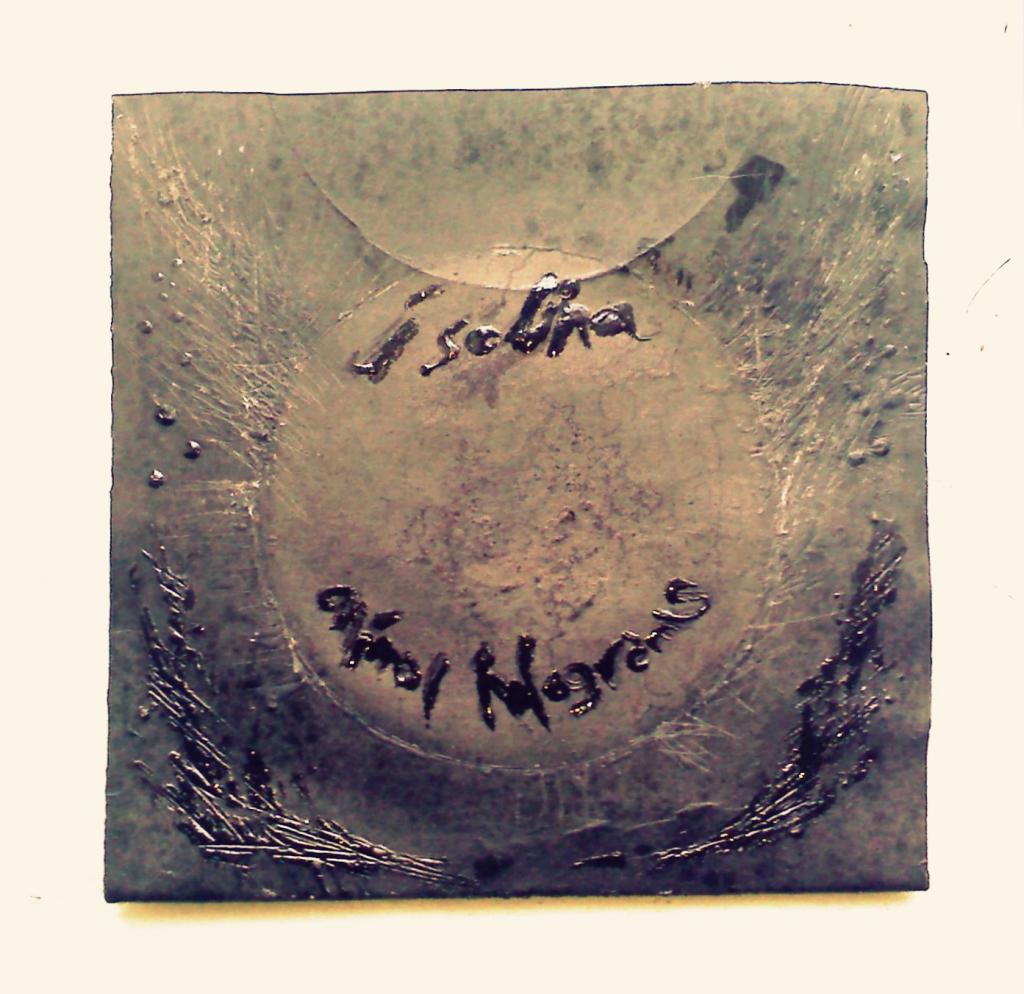
One of a kind, folks.
QRD – Anything else?
Jason – Thanks for your interest in me & Animal Holograms! If you like what you hear, let us know. We want to hear from you. Animal Holograms is also currently writing for an EP, possibly a full-length depending on time, which is expected to be released in late spring or early summer 2014. Thanks, again!
